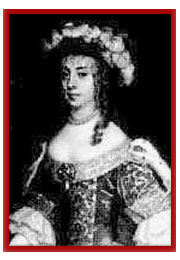Margaret Cavendish, Duchess of Newcastle
(1623-1673)
England
 "I
would rather die in the adventure of noble achievements than live
in obscure and sluggish security." Margaret
Cavendish
"I
would rather die in the adventure of noble achievements than live
in obscure and sluggish security." Margaret
Cavendish
Margaret (Lucas) Cavendish was born in
1623 in Colchester, Essex, England. Because Margaret lived at
a time when women were given very little education, she learned
only the basics of reading and writing, as well as needle-work,
singing, dancing, and musical instruments. While still young,
Margaret decided that she wanted to be known for her wit and so
began writing. When she was 17, a civil war broke out in England.
Margaret was forced to flee to France because her family supported
the King and Queen.
While in France, she became a maid of honour to Queen Henrietta
Maria and also met William Cavendish, the Duke of Newcastle. In
1645, they married. William and his brother, Charles, gave Margaret
informal lessons in science and philosophy to pass the time.
In 1653, two years after returning to England, Margaret published
her first book, Poems, and Fancies. She went on to publish fourteen
books about science. She also wrote plays, poems, philosophies,
orations, and discourses. Margaret was criticized for her poor
spelling and grammar, but she never apologized instead she stated
that it was "against nature for a woman to spell right."
Her spelling and grammar were only the
beginning of the criticism that earned her the name "Mad
Madge." Not only was she the first woman in England to write
for the purpose of publication, but she also was the only woman
of her time to write about science. In her attempts to "die
in the adventure of noble achievements," Margaret spoke out
against many of the traditions of her day, earning herself further
criticism. "Women live like bats or owls, labour like beasts,
and die like worms." She spoke to the lack of education that
women received. "In Nature, we have as clear an understanding
as men, if we were bred in schools to mature our brains."
She was particularly distressed by the lack of overall opportunities
for women. "We are shut out of all power and authority, by
reason we are never employed either in civil or martial affairs,
our counsels are despised, and laughed at, the best of our actions
are trodden down with scorn, by the over-weening conceit, men
have of themselves, and trough a despisement of us."
In a time when women were expected to be dutiful wives who did
not attract too much attention, Margaret spoke out, wore eccentric
outfits in public, wrote extensively, and refused to be defined
based only on her gender. Although her explanations and poems
about science seem outrageous now, her theories stretched what
scientists of her day knew and understood. She wrote about atoms
when microscopes were brand new. She introduced the public to
science through poetry and simplified explanations.
 Of
Loose Atomes
Of
Loose Atomes
IN every Braine loose Atomes there do
lye,
Those which are Sharpe, from them do Fancies flye.
Those that are long, and Aiery, nimble be.
But Atomes Round, and Square, are dull, and sleepie.
Margaret’s adventure ended in 1673 after a life without
obscurity or sluggishness. She will be remembered as not necessarily
for her contributions to science, but for her contributions to
the cause of women, which set the stage for future women philosophers.
Classroom Discussion Questions:
How would Margaret Cavendish have answered the question: "Compassion
or Violence:
Which has a greater impact on society?"
What inventions since the 1600s might Margaret Cavendish be most
impressed with?
What are some of the advancements that women have made since Margaret
Cavendish’s time?
Margaret was a pioneer in her time, both in science and women’s
issues. Who are some of today’s pioneers? Are they using
ideas that can be traced back to her philosophies? Which ideas?
To learn more about Margaret Cavendish,
follow these links:
http://dmoz.org/Arts/Literature/World_Literature/British/17th_Century/Cavendish,_Margaret/
http://www.luminarium.org/sevenlit/cavendish/index.html
http://www.pinn.net/~sunshine/march99/cavndsh.html
http://www.triangle.co.uk/wow/04-03/wow-04-03.htm
http://www.hypatiamaze.org/cavendish/scicav.html
http://chaucer.library.emory.edu/cgi-bin/sgml2html/wwrp.pl?act=contents&f=%2Fdata%2Fwomen_writers%2Fdata%2Fatomic.sgm
TO LEARN ABOUT OUR OTHER "PHILOSOPHERS
OF THE WEEK" CLICK ON ONE OF THE LINKS BELOW.

